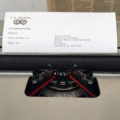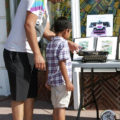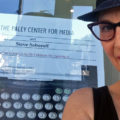And Dateline’s video sums it up very well…
It is a true delight to share my vintage machines with the general public and writers so they can experience the creative process, learn a skill and about the history of communication and technology.
Younger people have either never seen or used one, sit down and just look, uncertain how to proceed. Then a lesson ensues either by their parent or me. It is what was used before computers. It’s a printer and a musical instrument… Watching them think, it’s a mediation.
They don’t know how to get the paper in the machine, so I show them. Beginning with the sound of mechanical notches clicking as the knob of the platen is turned to roll the paper to the top of the empty page.
“This one doesn’t work,” because they are not pushing the key hard enough. It takes a lot of finger power to strike the key. Each machine has a different feel to it. The older ones require a stronger stroke. Witnessing the cause and effect of the key striking the page and leaving the imprint is instantly satisfying. Although it spurs concern about mistakes showing. I tell them it is okay, “your mistakes will show and you just strike through it and continue… to error is human, live with it, like life!”
The bell at the end of the line is like scoring a point. It makes it fun, like a musical instrument. Once at the end of the line of type, it stops and they think it is broke again. I I show them the “carriage” return which is the enter button on a computer.
They ask, “Where is the 1?” The duplicity of the lower case “l” key on a typewriter is an additional intrigue. And the idea that the exclamation point is a three step process of the shift 8 key, scoot the carriage return back one, add the period is proof that the exclamation point was seldom used in earlier communication!
People are intrigued. Depending on their generation, they either have a typewriter story to tell me, for instance that is how they learned to type or how they got their first job. You never forget your first typewriter, the one you took to college or the one your relative had. Older or younger, some have to be pulled away from my interactive typewriter display!



